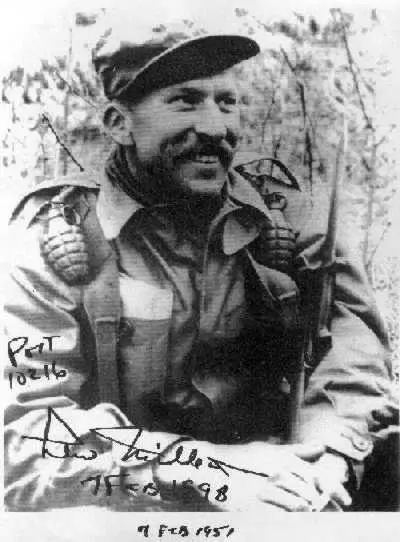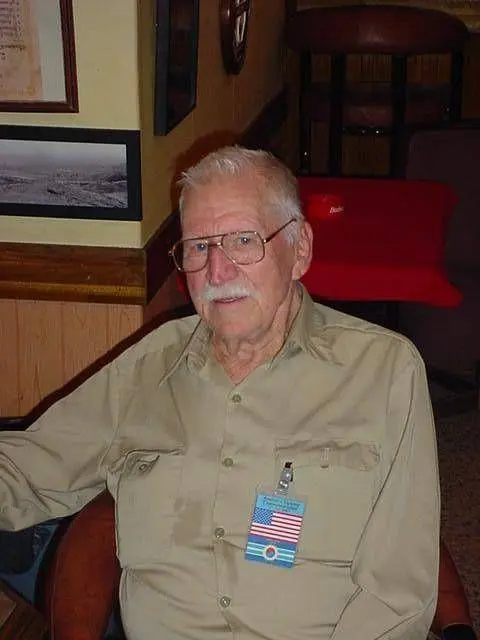He bounded to the base of the hill. There he waited for his platoons to form up. "We'll kill'm with the bayonet! Let's go!" he yelled when they were ready. Up the hill the two platoons went, all the GIs yelling at the top of their voices. Above them, Millett appeared on the skyline, rifle in one hand, waving his men upward with the other. Even as he did so, Chinese soldiers scurried from their foxholes, skittering down the reverse slope helter-skelter.
By the time the two platoons joined Millett on the crest only a few enemy stragglers remained. They were quickly dispatched. To the rear, the rest of Millett's battalion observed the audacious charge. The colonel quickly came forward to shake Millett's hand and congratulate him for his courage. That night the colonel began the paperwork that would bring Millett the Distinguished Service Cross. Little did he know that Millett's charge was but a rehearsal for what would come just forty-eight hours later.
At midday on February 7, Company E had the point for the battalion. Near the smoke-blackened village of Soam-ni, just west and south of Osan, they approached a ridge line. On military maps, it was designated Hill 180. To the men of Company E and the annals of U.S. military history it would forever be "Bayonet Hill."
Accompanied by two of his platoons astride tanks, Millett approached Hill 180, fully expecting to bypass it completely. Then one of his men noticed movement among the thick foliage near the top of the hill. It was crawling with Chinese. And Company E sat almost directly under their guns. Once apprised of the situation, Millett quickly ordered the tanks off the road. He got his two platoons deployed along a paddy dike.
By now the Chinese had opened fire. A number of Millett's men fell, cut down by vicious machine-gun fire. Leaping aboard the nearest tank, Millett grabbed its .50-caliber machine gun. He sent a stream of tracers flying toward the enemy position. "Keep it going there," he told the gunner. Then he jumped off the tank and moved on. He knew from here on it was all a matter of timing. He had to get an attack under way quickly. He didn't want these Chinese to get away like the others had two days earlier.
Millett called to one of his platoon leaders to get ready to move out. Seconds later, enfilading fire from a previously quiet Chinese machine gun tore into the first platoon. Casualties mounted. Then the .50-caliber machine gun supporting first platoon went silent--jammed with a ruptured cartridge. Millett swore under his breath. His attack was crumbling even before it started. He scrambled from his position and raced across the bullet-swept ground to the first platoon. Spotting the platoon sergeant as he barreled into position, Millett just hollered at the men, "Get ready to move out! We're going up the hill. Fix bayonets! Charge! Everyone goes with me!" He raised his rifle and took out across the open fields.
Bounding from the small rises and hurdling the ditches, Millett kept his feet across the ice-covered ground. Behind him the platoon sergeant and a dozen men ran after Millett. Those who hadn't followed were cut down minutes later as enemy machine-gun fire from Hill 180 zeroed in on them. When he reached the base of the hill, Millett flung himself down under a rocky outcropping while he waited for the others to catch up. After they did Millet motioned upward. "Let's go!" he said. Dashing from rock to rock. Millett made the first of three small knobs that comprised Hill 180. The center and far knob rose some twenty meters higher. Millett spotted a Chinese machine gun to his left. He ordered a BAR to fire on it. Another soldier spotted eight Chinese squatting in a hole just ten yards from Millett. The captain ran to it, firing his carbine and throwing grenades. The enemy died.
Millett now radioed for his third platoon to come forward. After he had them in position Millett told them, "Attack straight up the hill!" With their bayonet-tipped rifles carried at high port, screaming Chinese phrases as they ran, Millett and his assembled men raced toward the two higher knobs. Lunging into the first line of enemy foxholes, the GIs ripped into the Chinese, bayonets first. The terror-filled shrieks of the bayoneted enemy rose above the din of battle. Millett was so far in front of his men he had to dodge grenades thrown by both sides. Ignoring the thundering explosions, he charged headlong at an anti-tank gun firing point-blank at him. A few well-tossed grenades took care of that weapon.
A cluster of grenades flew down from a Chinese position farther uphill. Millett danced and dodged around, avoiding the detonations of eight grenades. A ninth got him, sending hot steel shards into his back and legs. He could feel the blood coursing down his skin, drenching his fatigues beneath his parka. Unmindful of the intense pain, Millett continued his charge. He urged his men forward. "Let's go!," he screamed. "Use grenades and cold steel! Kill 'em with the bayonet!" At the crest of the highest knob he jumped into one arm of a V-shaped slit trench. With a savage thrust of his bayonet he impaled one enemy soldier. He had to fire a round to dislodge his weapon. A second enemy soldier rushed at Millett. The emboldened captain met him like a frenzied tiger, jamming his sharp steel blade into the man's throat, ripping it wide open. A third Chinese, in the far arm of the V, raised his rifle. Before he could fire Millett was on him, slamming his blood-stained bayonet into the enemy soldier's chest. While Millett dispatched the soldier, the rest of his men rushed past. Millett leaped after them. Together they went on, screaming and yelling, firing from the hip, ripping and stabbing enemy flesh with their bayonets, throwing grenades into bunkers and foxholes until they had completely eliminated the enemy from the hill.


